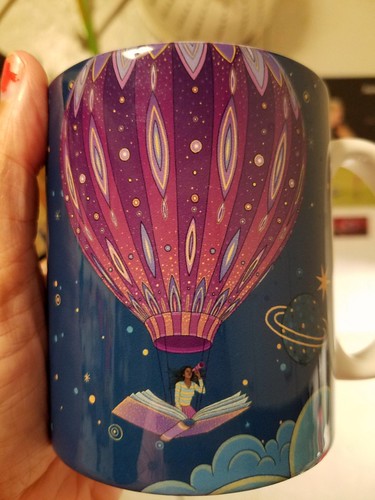
I spent this past Saturday at the National Book Festival soaking in bookish vibes. The festival used to be held later in September (and on the Mall and over two days), but they’ve moved it indoors and up in the calendar year (I assume the two are related) the past five years. I don’t love those changes, but I’ve reconciled myself to the fact that lots of other people do and that it’s unlikely to return to the festival it started out as. I mean, there are still authors and books and book lovers, so the most important parts of the festival remain intact, and that’s the important thing.
While I prepared for the day in my usual way, by going through the entire list of authors and highlighting the ones that sounded interesting to me, I knew that there was no way, short of cloning that I’d be able to attend all 45 sessions I marked. That’s not really my goal, of course.
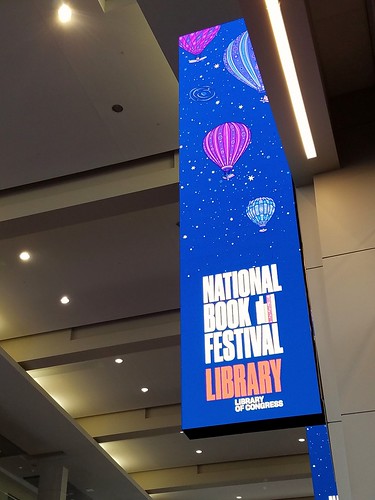
In part, it’s to see where authors I’m particularly interested in seeing overlap time wise. And partly it’s to help me cope with the overwhelming crowds. I have learned to recognize when an author is just too popular for me to deal with (which tends not to be something you can tell for sure until you’re there with a thousand people) and I walk away. (The first year the moved the festival indoors, I wasn’t prepared for the oppressiveness of the crowds and had a humungous panic attack that nearly sent me home from the event in tears after only an hour, so now I prepare.) There are at least a half dozen authors speaking at any given time, which means there is usually a stage where I can find more space, and having several highlighted means I don’t spend precious time looking up the author and what they’ve written while the talks begin.
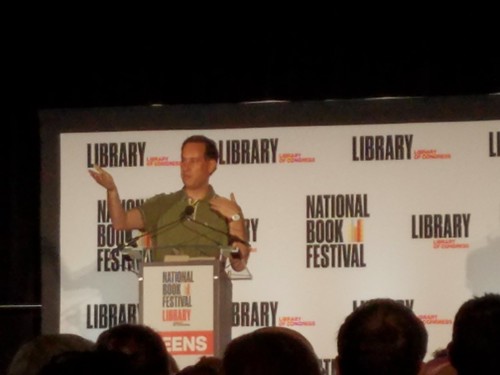
My first author of the day was David Levithan, who turned out to be just as funny as his books had led me to believe he’d be. He has two books out this fall. The first, another collaboration with Rachel Cohn — their fifth — is out now. Sam & Ilsa’s Last Hurrah focuses on twin siblings about to head off to college and centers around the theme of toxic dinner parties. David said that they come up with a theme and just start writing alternating chapters. They don’t plan ahead and they don’t discuss their work, so they’re living the events with their main characters. But they do like to do things like add weird twists to each others characters. He said by now they’re on to each other’s tricks, so now they’re doing double crosses instead. The other book, Someday, is the third in the series that began with Every Day. I neither read that book, nor watched the movie, but David said that this book responds to both the first two books, as well as to the film adaptation, which he said changed a few things for the better from his book and he wanted to keep them. In the Q&A portion, David was asked if he had any advice for how to write more diverse stories. His response was to both live a more diverse life and to find the commonalities with other people and characters, even when they aren’t obvious.
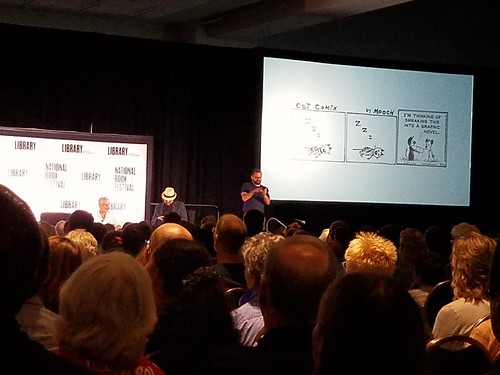
I next headed downstairs to catch Patrick McDonnell, the creator of the Mutts comic strip and graphic novel series. He shared that he was hired to draw comics about other topics, but started including a small dog in each one as a recurring character. When he decided he wanted to draw his own strip, he went out and got a Boston terrier, which he named Earl. He came prepared with slides of his comics, including his shelter stories, which feature animals available for adoption and which elicited a room full of “aww’s.” He also shared how drawing stories about animals has made him an advocate for animals in other ways, including a vegetarian diet, not using animals for testing purposes or treating them inhumanely, and not polluting.
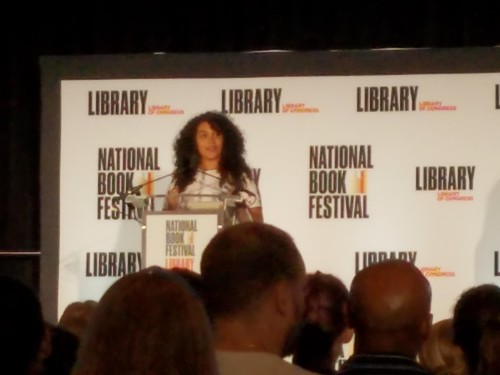
My next two authors were locals. Elizabeth Acevedo is a poet and recently published a YA verse novel, The Poet X, to great acclaim. She alternated between sharing poems and giving some of the background of her novel, which she said grew out of both her experiences as an 8th grade teacher in Prince George’s County (where she said her students were desperate for books that reflected their lives) and as a student in an MFA program (where it became obvious that her professors and her classmates were not her intended audience). She spoke at length about recognizing that others’ lived experiences are just as valid as your own and about being generous with your empathy and understanding.
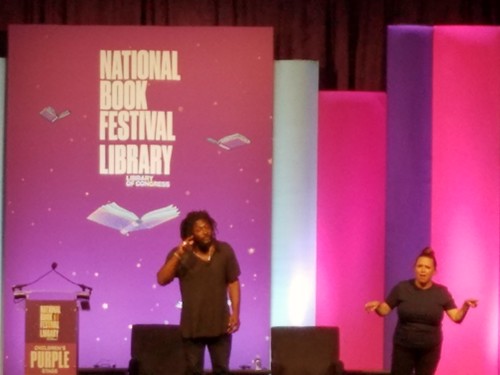
Jason Reynolds is one of the most prolific writers out there right now and he’s great with kids, so his session was fun to watch (he was talking music when I walked up, a few minutes into his session). He said his mom told him not to trust anyone who’s “all cry and no laugh,” and added that “Life is good … and bad … and complex,” all of which are reflected in his books. Kids love to ask authors why they write books. Jason’s response was that Once you read one of his books, we’re friends. “And that means someone is always thinking of you. And that’s a powerful thing.” I mean, isn’t that why so many of us read (and re-read)?
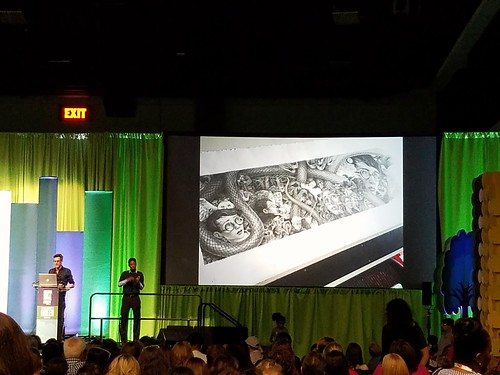
Brian Selznick’s last three books are some of my favorites, so I’d hoped when it was announced that he was one of the speakers that he was announcing a new one was coming out. Alas, it was to promote the new cover designs he’s done for the 20th anniversary editions of Harry Potter, which seems like a silly thing to be disappointed about. He brought a ton of slides, talking about his process. All seven covers were designed simultaneously and can be laid next to each other to create a comprehensive, but non-spoilery mural of Harry’s story, with a snake slithering through them to tie them together. He shared that his favorite character is Dobby, that his house is Hufflepuff, and that he re-listened to the audiobooks as he was working in real time finishing the drawings. He also revealed that Harry’s glasses are those he wore in his cameo in the film version of Wonderstruck and that his model for the evil Dolores Umbridge is his husband. (I took a lot of photos of slides…)
After that, I skipped the session I wanted to attend (crowds) and instead headed in to hear a Luis Alberto Urrea, whose books I’d now like to check out. I mean, how can you not like a guy who talks about the good fortune of his being an author by saying, “I can’t not go to the bookstore and I can’t not buy every new Mary Oliver book,” so this was obviously the perfect career.
My two authors were on the genre stage and were thriller author Jeffery Deaver and mystery writer Louise Penny.
Deaver talked a lot about the writing process, saying that there are two types of authors — “plotters and (fly by the seat of your) pantsers.” He is and prefers the first, because “I don’t get on an airplane that hasn’t been built to an engineering blueprint,” adding that when you write to an outline, you can write the end at the beginning or the beginning at the end. Plus, “some days you may not feel like murdering anyone. You know, because there are vidoes of baby goats in pajamas to watch.” But when the internet goes out and the cable guy is late to arrive and then can’t fix the problem, “you have your next victim…” I didn’t agree with everything he said, including that as people’s attention spans have gotten shorter, he’s compensated by writing simpler punchier text, to keep them interested. (There were clearly some teachers sitting behind me who grumbled at this comment, as well.)
Louise Penny, as many of you know, writes the Inspector Gamache Three Pines series set in Canada. In all my years at the festival, I’ve never seen an author get a standing ovation when they walked on stage, but she did. She’s funny. (Apparently some people have difficulty with the minute amount of French she includes, as well as terms like “toque”: “It’s winter. He put it on his head when going outdoors. Clearly it’s a refrigerator.”) She acknowledges that this wasn’t the sort of book she intended to write (she was aiming for a literary masterpiece to show up everyone who ever doubted her, but got stymied by the pressure and instead suffered from writer’s block for more than a decade). And she explains that her books are really about our sense of belonging and finding home. She made Inspector Gamache such a good guy, she said, in part because she remembered Agatha Christie tired of Poirot, & she thought the way to avoid the problem was to make sure her protagonist was the sort of character she’d want to marry, a man who was capable of change and growth. She concluded by asking the audience not to give away spoilers in their questions, neither in plot nor in character development, and instead suggested, tongue firmly planted in cheek, that instead we could just spend the time praising her. It was a lovely way to end the day.
It sounds like an awesome way to spend the day.
I always liked that Agatha Christie included a sprinkling of French words in her Poirot books. I would probably like that about Louise Penny’s books, too. Do you recommend the series?
Comment by Karen 09.05.18 @ 9:31 pm@Kat: It’s one of my favorite events every year, despite the anxiety caused by the crowds. You should definitely come one year!
Comment by soe 09.06.18 @ 1:21 am@Karen: I’ve only read the first one (which I liked, but didn’t love), but everyone says it just keeps getting better. Penny herself said that the first book is like a cocktail party, where you meet some people you might like. The second book is like meeting for coffee, and that it’s not until the third or fourth book where you’re pretty sure you’re going to be friends.
Comment by soe 09.06.18 @ 1:23 am